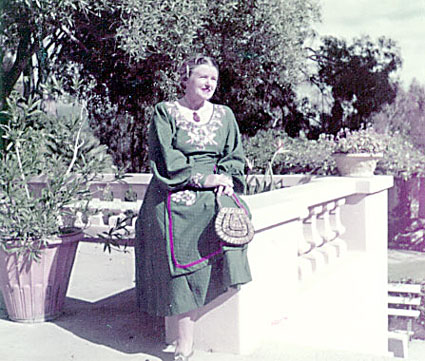 Fifty Years 1947-1997
Fifty Years 1947-1997
Excerpts from Music Academy of the West, Santa Barbara
by Sharon Crawford [These excerpts chosen to note Lehmann’s association with the MAW] [A recent history released by MAW itself may be found at: https://musicacademy.org/about-us/history/]
Legendary German operatic soprano and lieder singer Lotte Lehmann attended the [luncheon meeting at the Montecito Country Clubon 22 September 1946]…Many of the luncheon guests were in Santa Barbara to attend a concert by recently retired Metropolitan Opera star Lotte Lehmann. [retired from opera, not recital performance] Although Madame Lehmann was not a speaker at the luncheon, she demonstrated her support by attending, along with her friend Dr. Frances Holden…Madame Lehmann provided the initial impetus for a music school when she was in Los Angeles on a concert our in 1940, and mentioned to Isabel Morse Jones that Santa Barbara would be a perfect place for a summer Music Festival similar to the Salzburg Festival.
The first event of the Summer Festival, on July 8 [1947]–a song recital benefit performance by Lotte Lehmann accompanied by Gwendolyn Koldofsky–was sold out, as were her annual Academy benefit recitals for the next four years…
“Yesterday I had a look at the fantastic house that someone gave to the Music Academy of the West. Such a thing could only happen in America…”–Mme Lotte Lehmann, in a letter to her friend, conductor Bruno Walter.
Having announced her retirement from touring and performing recitals, Lotte Lehmann was at last free to devote longer periods of time to the Music Academy. When it was announced that she would give master classes during the 1951 season, a deluge of calls came in from local people interested in witnessing the classes. Madame Lehmann agreed to open the classes to auditors, feeeling that the presence of an audience would be good for the students.
The first master class was reviewed in the Santa Barbara News-Press:
A world renouned artist and great singer—Mme Lotte Lehmann—was revealed as an utterly sincere and vitally engergetic teacher here yesterday afternoon when she conducted a master class for ther first time in her highly successsful life.
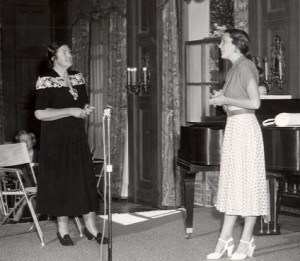 Madame Lehmann admitted to feeling a little uneasy at first, standing in front of the class of 50 students and 25 auditors. During the session she encouraged students to present their pieces with their whole beings, using facial expression and body movement to help in the interpretation of the music. She urged students to interpret a song in their own way and never imitate another singer’s interpretation stating:
Madame Lehmann admitted to feeling a little uneasy at first, standing in front of the class of 50 students and 25 auditors. During the session she encouraged students to present their pieces with their whole beings, using facial expression and body movement to help in the interpretation of the music. She urged students to interpret a song in their own way and never imitate another singer’s interpretation stating:
“I do not want at all that you imitate me. I will listen to the way you develop a song and then make my suggestions. If you feel you must sing it entirely differently from the way I suggest, I hope you’ll tell me ‘I cannot feel it your way,’ and we will try to arrive at a way which will satisfy you and still convey the right feeling to the audience.”
At the end of the class, Madame Lehmann waved aside the ovation she received, saying, “Please don’t applaud, it makes me think I’m about to have to give a recital.” From this point on, the master class became the signature event of the Music Academy of the West.
Lotte Lehmann’s more active involvement in the Music Academy had the beneficial effect of bringing [her friend] Dr. Frances Holden into a deeper commitment to the Academy as well…
The highlight of the 1952 Summer Festival was a benefit concert given by Lauritz Melchior–more a music evening at home than a typical benefit performance. Melchior set the mood of the evening when he paid a warm personal tribute to Mme Lotte Lehmann, who was in the audience. He said, “I was fortunate enough to live my artistic life together with her. One could not find a more wonderful comrade or colleague on or off the stage.”
[There follows a chapter in this booklet called “The Lehmann Years”]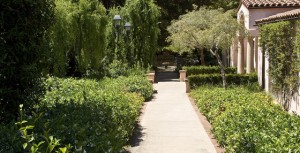
At the end of 1953, Madame Lehmann was made Honorary President of the Music Academy, a new position created by the Board of Directors in recognition of her support for the Academy. In her acceptance letter to Board President Maurice Faulkner, Madame Lehmann wrote:
“My love and ambition for the Academy is much too sincere that I would be able to look at this title only as I would look at a shining star which has just the duty to shine and stay aloof… I consider it much more of a job—a job which has a great and wonderful goal: to help in developing to perfection what up till now is only a beginning. A very promising beginning. I hope and pray that I may be of some help.”
She took the job very seriously, and the help she provided the Academy went far beyond her role as a teacher and a source of inspiration for students. By the simple fact that she was Lotte Lehmann, she instantly became ambassador and publicity agent for the Academy….
Perhaps in anticipation of future opera productions at the Music Academy, Lotte Lehmann and [former opera star] Ganna Walska donated many of their personal opera costumes to the Academy in 1954. They made the announcemnet at a pre-arranged “photo opportunity,” with two Academy students modeling costumes on the ornate stairway at Madame Walska’s estate, Lotusland. Madame Lehmann took the opportunity to request that reporter Rosario Curletti “write of how we need costumes for the Academy student opera workshops, especially for male roles.” Madame Lehmann’s gifts included her costumes for Lohengrin,…Elizabeth in Tannhäuser, Sieglinde in Die Walküre, and Marschallin in Der Rosenkavalier. Dr. Frances Holden confided to the reporter that the Museum of the City of New York had begged Lehmann for her costumes…
In 1956 the Academy celebrated its tenth anniversary season with a performance of The Marriage of Figaro. It aroused sufficient interest to be reviewed by the Los Angeles Times….the highest praise was for Madame Lehmann’s professional direction:
“There was an air of perfection about it all that pointed to someone not only well versed in the great traditions of opera but who is an artist great enough to adapt to circumstances dictated by an all-student cast.”
Chuck Perlee of the Pasadena Star News wrote a column in September 1956…He was particularly impressed by two master classes of Lotte Lehmann’s:
“At these classes Lotte proved that age doesn’t mean a thing. At 68 this great actress and personality showed in Manon that she could walk better, dance better and be more passionate than most ‘Manons’ of today. And during the Lohengrin rehearsal…she sang a long passage of Elsa’s. Lotte, forgetting she had lied to us that she could no longer sing, sang like she was 30 to 35…”
The opera chosen for 1957 was Die Fledermaus. After the performance music critic Ronal Scofield raved:
“Sheer genius must have inspired Mme Lotte Lehmann, her stage director Carl Zytowski and conductor Maurice Abravanel, and the entire cast and crew, to bring a student production to such a high level of professional artistry, verve and style in the space of a few weeks…”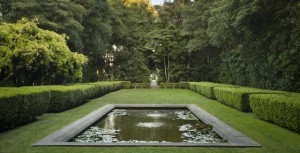
Lehmann Triumphs
At the end of the summer season, Madame Lehmann traveled to London to conduct a series of master classes. Although she had not sung in London for some 20 years, her return there turned out to be almost comparable to a performing artist’s “return engagement.” The British seemed skeptical at first about the value of treating coaching sessions as public peformances, but the experience of seeing Madame Lehmann bring out each student’s potential made an impression, especially with the critics. They realized that she had a talent of rare and unique value for the world of music.
Los Angeles Times music critic Albert Goldberg reported: “Lotte Lehmann has been holding classes in London’s Wigmore Hall, and the press has been reviewing them as major musical events with a most un-English display of enthusiasm.” Goldberg quoted from a letter that Lehmann had sent him:
“The success was quite overwhelming. I was already greeted in the beginning like a home-coming queen…The young singers are all quite good. Some are rather stiff…but I brought them to life and it was such a satsifaction to see how they reacted. They had been scared to sing and act before an audience and of being ‘criticized’ in public, but later on they told me that they absolutely forgot that an audience was present. I am so very happy about it.”
Madame Lehmann’s teaching method had more to do with interpretation than with vocal technique; she accepted only advanced students who already sang very well. In an interview she expressed surprise that advanced students didn’t know how to go about preparing for a role:
“They just sing the melodies and have no idea how to bring them to life. What I do is try to arouse their imaginations. I don’t want to sound arrogant—But I have the gift to make students come alive in a short time.”
Her gift, simply put, was to enable singers to feel–and thus project to the audience–the meaning of song.
Even Time magazine reported on Lehmann’s master classes in London, quoting from the role of Marschallin in Der Rosenkavalier: “How can it really be that I was once the little girl and that one day I will be the old woman?…How can it happen, when, after all, I always remain the same?” Time’s writer concluded: “In the sense of the Marschallin’s words, she is still the same.” So, the young woman who once had thrilled the opera world, then in middle age won over audiences to the charms of German lieder, still retained all of her stage magnetism as a teacher. Lotte Lehmann was enjoying a new kind of stardom.
In honor of Madame Lehmann’s 70th birtday, the Music Academy presented Richard Strauss’s opera Der Rosenkavalier. Madame Lehmann had sung all three of the major soprano roles, conducted by the composer himself, when the work was new to the repertoire of the Vienna State Opera. But the role of the Marschallin, which she made famous, was her favorite–and it was that role she had sung at her farewell appearance at the Metropolitan Opera in 1945. For the 1958 Music Academy production, students Kay McCracken and Lois Townsend alternated as the Marschallin: each wore the Marschallin costume that Madame Lehmann had donated to the Academy…
At the end of the performance the Board of Supervisors of the County of Santa Barbara presented Madame Lehmann with a parchment decorated with the official seal of the County, and inscribed:
“To Lotte Lehmann–whose talents in our midst have enriched our lives for today and will continue to enrich our lives for countless tomorows through the younger generation she is inspiring with her great traditions.”
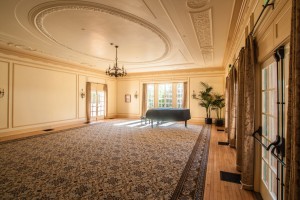 Having staged two very successful operas at the Music Academy, Lotte Lehmann was able to convince Metropolitan Opera decision makers that by auditioning singers on the West Coast, they not only could discover future talent for the Metropolitan, but also stimulate interest in opera nationally. The auditions were held at the Music Academy of the West, with Madame Lehmann heading the panel of judges. When audition day came, Madame Lehmann, who had seven students entered in the contest, said she felt so much empathy for all the young singers that she had to disqualify herself. Her colleague, Mme. Rosa Raisa, served in her place for the entire competition, as she already had agreed to do in judging the seven singers who had studied with Madame Lehmann. The winner, Grace Bumbry, recieved an all-expense-paid trip to New York to compete in the Metropolitan Auditions of the Air. Second place went to another of Mme. Lehmann’s students, Alfred Jensen, of Solvang, California. After the West Coast Auditions, John Gutman, assistant manager of the Metropolitan Opera and one of the regional judges, said:
Having staged two very successful operas at the Music Academy, Lotte Lehmann was able to convince Metropolitan Opera decision makers that by auditioning singers on the West Coast, they not only could discover future talent for the Metropolitan, but also stimulate interest in opera nationally. The auditions were held at the Music Academy of the West, with Madame Lehmann heading the panel of judges. When audition day came, Madame Lehmann, who had seven students entered in the contest, said she felt so much empathy for all the young singers that she had to disqualify herself. Her colleague, Mme. Rosa Raisa, served in her place for the entire competition, as she already had agreed to do in judging the seven singers who had studied with Madame Lehmann. The winner, Grace Bumbry, recieved an all-expense-paid trip to New York to compete in the Metropolitan Auditions of the Air. Second place went to another of Mme. Lehmann’s students, Alfred Jensen, of Solvang, California. After the West Coast Auditions, John Gutman, assistant manager of the Metropolitan Opera and one of the regional judges, said:
“Never in all my experience in regional auditions have I seen such a wealth of promising talent, and excellently trained, as I have in this California competition. This is not something I say to please your local musical organizations and teachers, it is an honest evaluation based on five years experience throughout the country.”
Gutman’s tribute was directed not only to the young singers, but even more so to Madame Lehmann and the Music Academy’s success with the master class technique.
Madame Lehmann’s worldwide attention, the excitement of watching rising stars, and favorable publicity from the press all combined to command the attention of Santa Barbara audiences…
At the end of 1958, Lotte Lehmann announced her plan to take a sabbatical trip to Europe during the following summer, attending the summer festivals in Bayreuth and Salzburg, and visiting several former Music Academy of the West students who were singing professionally in Europe…
Madame Lehmann’s tenth and final opera production for the Music Academy was another with which she had been closely associated for many years, Beethoven’s Fidelio. Since Madame Lehmann was widely recognized as an authority on the opera, it was expected that many people who remembered seeing her perform in it would want to see her final production with singers whom she had trained and coached. As early as March 1961, Academy Executive Director Ruth Cowen claimed: “Production of this opera under the supervision of Madame Lehmann has aroused interest all over the country,” siteing ticket inquiries from as far away as New York. In order to allow Madame Lehmann to devote all of her energy to the opera, Ruth Michaelis of the Bavarian State Opera was engaged to take over the last four weeks of vocal master classes. Miss Cowen’s prediction was right. All three performances of Fidelio were sold out, and the opera received rave reviews from all over Southern California. The role of Leonore was sung by Dororthy Sandlin, who wore the same costume Madame Lehmann had worn when she sang the role.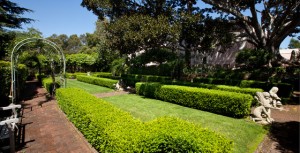
The news that this would be Madame Lehmann’s last summer teaching at the Academy stimulated the National Educational Television Company to create a documentary film of her master classes. Sponsors for the production were the Metropolitan Opera Association, the Metropolitan Opera Guild, and Radio Center in New York. Filming was done by San Francisco station KQED and funded by the Ford Foundation. The classes were filmed before an audience of 200–as they were regularly conducted, with no rehearsals. The premiere screening of “Lotte Lehmann Master Class” was a gala event, held in the World Affairs Center in New York City the following April, with a reception for Madame Lehmann following the screening.
Before 1961 was over, Madame Lehmann had added yet another honor to her long list. At commencement ceremonies in June the University of California, Santa Barbara conferred on her the honorary degree of Doctor of Fine Arts. The degree publicly recognized her efforts over the past decade in working closely with UCSB music faculty members and students, to the benefit of both the University and the Music Academy of the West….
Madame Lehmann had brought an international reputation to the Music Academy of the West, not merely because of its association with her famous name, but more significantly, because by the early 1960s some of her former students were becoming recognized in the opera world….
In addition to Marilyn Horne and Grace Bumbry, other names emerged as spotential stars of the future. Among them were Lucine Amara, Benita Valente, Dorothy Sandlin, Judith Reed Beckman, Jean Cook, and Norman Mittlemann…When interviewed, they never failed to credit Madame Lehmann’s training as a major factor in their success.
Madame Lehmann’s production of Fidelio as her dramatic exit from the Academy stage inspired two major donors, both of whom stated they were so impressed by the quality of that opera produciton, they felt they must do something to help assure the continuation and growth of the Academy. First came the announcement that an annoymous donor had established a permanent Lotte Lehmann Scholarship. An even larger gift from Mr. and Mrs. Adrian Wood financed a structure to contain a large teaching studio and several practice rooms….
Even after she retired from the faculty, the name of Lotte Lehmann continued to be associated with the Music Academy of the West. In August 1965 an article in the Philadelphia Bulletin bore the headline “Lotte Lehmann’s Imprint Inspires West Coast School.” The author, Max de Schauensee, had visited the Music Academy during the summer and was greatly impressed….The article quotes Board President Reginal Faletti’s homage to Lotte Lehmann:
“…I single out one who, from the time she joined the faculty in 1950, bringing with her an almost legendary past in the world of music, until her retirement a few years ago, directed all of her energies and musical genius to giving this Academy artistic stature and direction.”
The Music Academy of the West made a gala occasion of Lotte Lehmann’s 80th birthday in February 1968, hosting a special birthday dinner in her honor….The birthday cake was a replica of the Vienna Opera House. Dame Judith Anderson read a poem dedicated to Lotte Lehmann, written for the occasion by Robert Nahan. Lauritz Melchior spoke lovingly of working with Madame Lehmann; the first time had been fifty-two years earlier….Maurice Abranael…said:
“Sometimes we cannot see the music for the notes. Lotte Lehmann had the uncanny ability to see between the notes, behind the music. She is the high priestess of that meaning of music.”
Reginald Faletti announced that the Academy’s Board of Directors had established an endowment fund for a chair of music in Lotte Lehmann’s honor. When it was Madame Lehmann’s turn to speak, she said: “It is not everyone who can say ‘I lived exactly as I always dreamt I wanted to live.'” After dinner, the guests drove to the Granada Theater for a special musical salute to Madame Lehmann, with Zubin Mehta conducting the Los Angeles Philharmonic Orchestra. As part of the program, three of Madame Lehmann’s former students sang the final trio and duet from Der Rosenkavalier: Patricia Jennings Armstrong, Shirley Day, and Katherine Duke.
It seems that the Academy could not accept Madame Lehmann’s retirement as absolute. In November 1968 Maurice Abravanel anounced that she had accepted the Academy’s invitiation to present a series of four master classes in German lieder during the 1969 summer session. Abravanel stated:
“I am personally delighted to welcome Lotte Lehmann back to the Music Academy… She is undisputed as one of the great performing artists of our time, and is equally gifted as a teacher of interpretation…”
[A] most poignant commemorative recital was given on December 1, 1976 to honor Mme Lotte Lehmann, who had died at home on August 26. Grace Bumbry traveled from England to sing the memorial recital, a benefit for the Lotte Lehmann Scholarship fund. According to Bert Willard, the recital “was one that Madame Lehmann would have loved,” with some of her favorite opera arias and lieder of Brahms and Richard Strauss, “the songs of great meaning and personal involvement that meant so much to the maestra…. Miss Bumbry was able, thourgh her voice alone, to convey the meaning of the songs–that was the Lehmann touch and Grace has never forgotten it.”
The 1977 production of Der Rosenkavalier was billed as a tribute to Lotte Lehmann, who had died in 1976, because of her long association with the opera. Madame Lehmann had written in 1964:
“Long after I had given up most of my other roles in obedience to the inexorable command of time, I was still being recalled to the stage to recreate my favorite role, the Marschallin in Der Rosenkavalier. And whenever I sang it, I felt caught up in the sheer joy of it, swept away by its magic, the words and music streaming out as though they truly were part of myself.”
